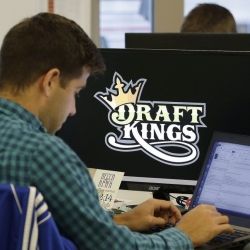
Yahoo!, PokerStars, and Paddy Power all have DFS products, but the FTC thought a FanDuel-DraftKings combine would monopolize the market.
DraftKings and FanDuel have ended merger talks after the Federal Trade Commission said it would oppose the move. In June, a federal judge placed a temporary restraining order on the daily fantasy sports merger.
FanDuel CEO Nigel Eccles said in a press statement that the two companies “have determined that it is in the best interest of our shareholders, customers, employees, and partners to terminate the merger agreement and move forward as an independent company.”
FanDuel and DraftKings: A History
FanDuel was founded in 2009 as a private startup funded by the Scottish government, but Nigel Eccles and FanDuel’s top staff is headquartered in New York City. Jason Robins and friends founded DraftKings in 2012 in Boston, where the company was headquartered. Despite a late start, DraftKings’ aggressive acquisitions and ad campaigns closed the gap with FanDuel from 2012 to 2015.
Until October 2015, the two companies were bitter rivals in varios investment drives and advertising battles.
When a DraftKings employee won $350,000 by placing 2nd in a Sunday guaranteed event on FanDuel, it caused a firestorm of trouble. Customers grew concerned that Ethan Haskell used inside information to gain an advantage. Though the two companies quickly changed policies involving employee participation and launched internal probes to assure no inside information was used, the public relations damage was done.
In the 21 months since, the two worked together in legal cases and lobbying attempts. A variety of state attorney generals in New York, Illinois, Texas, Michigan, Nevada, and other states sought to ban daily fantasy sports. A US district attorney in Tampa announced he would summon a grand jury to investigate the industry, while Preet Bharara said he would launch a probe in New York.
Eric Schneiderman Lawsuit
Ultimately, the most troublesome official was New York Attorney General Eric Schneiderman, who sought to ban DFS gaming and filed a lawsuit worth billions of dollars. Though FanDuel and DraftKings eventually negotiated an end to the lawsuit and lobbied for the legalization of DFS in New York State, it was a bruising and costly battle.
The two companies sought a merger to cut down on expenses in defending their industry against federal and state bans. A merged entity would have been able to coordinate legal and lobbying efforts better, while paying half the price in legal and lobbying fees. Without a major rival, advertising costs would have been much smaller.
Impact of Merger between FanDuel and DraftKings
Between the two companies, FanDuel and DraftKings own between 90% to 95% of the daily fantasy sports market in the United States. The FTC decided a merger would create a monopoly and harm competition.
Before the Ethan Haskell scandal of 2015, both companies were estimated to be worth about $1 billion. At the time, top media and sports broadcasting companies like Comcast and NBC Sports invested in their products. Major Wall Street investment firms made investments in the DFS industry, along with New England Patriots owner Robert Kraft, Dallas Cowboys owner Jerry Jones, and Dallas Mavericks owner Mark Cuban.
The major sports leagues embraced daily fantasy sports, even while suing New Jersey to enforce anti-sports betting laws. Major League Baseball, MLB, and the NHL signed promotional deals with either DraftKings or FanDuel. Though the NFL did not have a formal deal, a number of NFL franchises had sponsorship deals with the DFS companies. So did individual sports franchies in the other major American sports leagues. Both companies maintain significant promotional deals with those famous teams.
DFS Sites: Merger Would Not Have Affected Prices
Despite their prominence, FanDuel and DraftKings have said a merger would not lead to higher prices. They also point to major companies which owns DFS businesses, including Yahoo! Fantasy Sports Live, StarsDraft (Victiv) by PokerStars/Amaya, and Paddy Power Betfair’s newly-purchased DRAFT DFS site. The FTC did not see the competition as serious or viable, though.
Of the two companies, DraftKings appears to be the healthiest at the moment. Jason Robins said his company has 8 million customers and its playing community continues to grow by about 30% year-to-year. Some reports have suggested that FanDuel’s money flow is more problematic.
What Next after DFS Merger Fell Through?
Given those rumors, it would not be surprising to see a major online gambling company like PokerStars or Paddy Power-Betfair make an offer to buy out FanDuel (or DraftKings). The willingness or even intent to opt out of the business seems evident, so it would appear that one of the major daily fantasy sports companies is ripe for a takeover — at the right price.
